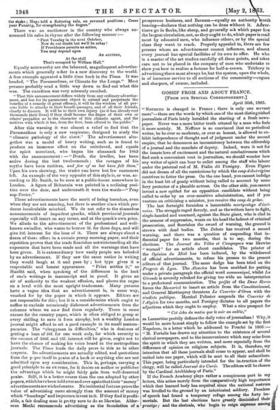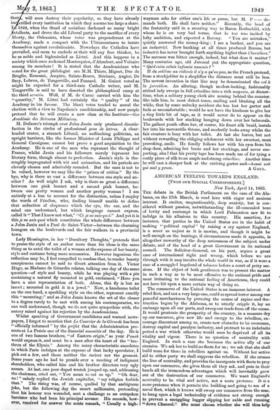GOSSIP FROM AND ABOUT FRANCE. [FROM OUR SPECIAL CORRESPONDENT.]
April 30th, 1863.
" NOTHING is changed in France ; there is only one servant more"—these are the words by which one of the most distinguished journalists of Paris lately heralded the starting of a fresh news- paper. Never was a more bitter truth uttered by a man who feels it more acutely. M. Nefftzer is so convinced that no periodical writer, be he ever so moderate, or ever so honest, is allowed to ex- hibit independence of thought and of judgment under the second empire, that he denounces an inconsistency between the editorship of a journal and the mandate of deputy. Indeed, were it not for the innate love of excitement and the natural combativeness which find such a convenient vent in journalism, we should wonder how any writer of spirit can bear to enlist among the staff who labour under the paternal rod of M. Fialin dit Persigny. Even Figaro did not dream of all the restrictions by which the coup d itutre'g,ime contrives to fetter the press. On the one hand, you cannot indulge in the least bit of gossip without being called to account by some fiery protector of a placable actress. On the other side, you cannot invent a new epithet for an opposition .candidate without being called to order by an over-sensitive administration, and if you venture on criticizing a minister, you receive the coup de grace.
The last fortnight furnishes a lamentable martyrologe d'ecri- vains. The struggle raged fiercely, and as thewriters have to fight, single-handed and unarmed, against the State giant, who is clad in the armour of suppression, wears on his head the helmet of criminal prosecution, and flourishes the sword of warning, the ground is strewn with dead bodies. The Debats has received a second warning, and there was a question of suspending that in- fluential paper for two months, that is to say, during the elections. The Journal des V ilks et Campagnes was likewise " warned" for an article about candidates. The printer of the Opinion du Midi has been induced, by the withdrawal of official advertisements, to refuse his presses to the present editors of that journal. The same dodge has been tried on the Frog,* de Lyon. The .illsacien has been snubbed for putting under a private paragraph the official word communiqué, whilst La Gironde is severely rebuked for giving too wide an interpretation to a prefectoraI communication. The prget of the Deux Sivres forces the Memorial to insert an article from the Constitutionnel, and General Martimprey threatens Le Courrier d'Oran with the vindicte publique. Marshal Pelissier suspends the Courrier de l'Algerie for two months, and Persigny dictates to all papers the adjectives which they ought to employ. What a nice prospect for
" Cet echo du matin que is soir on oublie,"
as Lamartine prettily defines the daily voice of journalism ! Why, it would be more hcnest simply to follow the example set by the first Napoleon, in a letter which he addressed to Fouche in 1806 :- " M. Portalis has drawn my attention to the existence of several clerical newspapers, and to the inconvenience which may arise from the spirit in which they are written, and more especially from the difference of opinion on religious subjects. It is, therefore, my intention that all these journals shall cease to appear, and shall be united into one paper, which will be sent to all their subscribers. This paper, being particularly intended for the instruction of the clergy, will be called Journal des Cures. The editors will be chosen by the Cardinal Archbishop of Paris." If the French Academy plays rather a conspicuous part in my letters, this arises merely from the comparatively high importance which that learned body has acquired since the national rostrum was levelled to the ground by an intoxicated soldiery. Freedom of speech had found a temporary refuge among the forty im- mortals. But the last elections have greatly diminished their prestige ; and the clericals, who begin to reign supreme among
their imperilled every institution in which they assume too large a share. 1848, when the dread of socialism darkened so many bright ntellects, and drove the old Liberal party to the sacrifice of every liberty, the Orleanists, whose voice was preponderant at the Academy, made a compact with the Ultramontanes to insure themselves against revolutionists. Nowadays the Catholics have prevailed, and seem to exclude at their will any free thinker, be he as noble and highminded as Littre". And this happens in a society which once reckoned Montesquieu, d'Alembert, and Voltaire among its members ! It is stated that the Academicians who voted for the great philologist are M.M. Thiers, Mignet, Due de Broglie, Remusat, Ampere, Sainte-Beuve, Merimee, Angier, De Sacy, Lebrun, de Tongerville, and Ponsard. M. Guizot voted as might be expected for a third-rate Catholic writer, and M.
Tongerville is said to have deserted the philosophical camp at the third scrutin. Well, if M. de Came carried with him the "quantity," M. Littre had certainly the " quality" of the Academy in his favour. The blank votes tended to annul the election with a view to Napoleon's candidateship, and now people pretend that he will create a new class at the Institute—the Acadimie des Sciences Militaires.
M. Dufaure's triumph over Jules Janin only produced dissatis- faction in the circles of professional gens de lettres. A clear- headed orator, a staunch Liberal, an unflinching politician, an upright barrister, like the former Minister of Louis Philippe and General Cavaignac, cannot but prove a good acquisition to the Academy. Ile is one of the men who represent the thought of France, whilst Janin and his followers merely represent her literary form, though almost to perfection. Janin's style is tho- roughly impregnated with wit and animation, and his periods are cleverly chosen and admirably rounded. But the man is not to be valued, however we may like the " prince of critics." By the bye, why is there so vast a difference between one style and an- other ? As well might I ask, why is there so great a difference between one pink bonnet and a second pink bonnet, be- tween one pretty woman and another pretty woman ? I am entirely at a loss to account for the distinction, unless I employ the words of Fendlon, who, finding himself unable to define that seduction of eloquence which the eye, the ear, and the mind can understand, but which language cannot express, called it " That I know not what," "Ce je ne sais quoi." And yet it is this je ne sais quoi which constitutes the whole difference between a Jules Janin and a Paul de Saint-Victor—between the charming loungers on the boulevards and the fair walkers in a provincial town.
Lady Blessington, in her " Desultory Thoughts," pretends that to praise the style of an .author more than his ideas is the same thing as to extol the toilet of a woman at the expense of her beauty, style and costume being mere accessories. However ingenious the reflection may be, I feel compelled to confess that, to render beauty conspicuous cannot be said to divert attention from it. Victor Hugo, as Madame de Girardin relates, talking one day of the same question—of style and beauty, while he was playing with a pin containing a natural fly mounted in gold, exclaimed, " Here you have a nice representation of both. Alone, this fly is but an insect ; mounted in gold it is a jewel." Now, a handsome toilet on the one hand, a sparkling style on the other, represent exactly this " mounting ;" and as Jules Janin knows the art of the chaser to a degree rarely to be met with among his contemporaries, we can well understand, though we do not quite sympathize with, the outcry raised against his rejection by the Academicians.
Whilst speaking of Government candidates and warned news- papers, I forgot to mention that Le Courtier de la Gironde has been " officially informed " by the prefet that the Administration pre- sents at La Preole one of the financial sommites of the day. He is one of two famous brothers, " of Eastern origin," as your Punch would express it, and must be a man after the heart of the "bre- thren of the Elysee." Among the many characteristic anecdotes in which Paris indulges at the expense of that lucky speculator, I pick out a few, and those neither the raciest nor the grossest. Some years ago he had to preside over a meeting of indignant shareholders, who called him and his brother directors very ugly names. At last, one poor duped wretch jumped up, and, addressing the chairman, cried out, " You mean to eat us up." " Oh dear, no I " calmly replied the Jewish capitalist, " my religion forbids that." The rising was, of course, quelled by that ambiguous joke, but the following day the smart millionaire, pretending that his honour was wounded, sent a challenge to an outspoken barrister who had been his principal accuser. His seconds, how- ever, received for answer the acute remark, " Usually a high mands both. He shall have neither." Recently, the head of the fraternity said in a sneering way to Baron Rothschild, with whom he is on very bad terms, that he too was incited by lofty ambition, and expected a Barony. " You are mistaken," quietly answered the money-king ; I am a banker, and you are an industriel. Now banking at all times produced Barons, but industrie has never brought forth anything higher than Chevaliers." The sarcasm was bitter enough, indeed, but what does it matter ? Many centuries ago, old Juvenal put the appropriate question, " Quid mint salvis infamia nummis 7 " If du sublime an ridicule il n'y a qu'un pas, as the French pretend, from a stockjobber to a shoplifter the distance must still be less. The newest invention in that line may be denominated the vol le la jarretare. An alluring, though modest-looking, fashionably attired lady sweeps in full crinoline into a rich magasin, at dinner- time, when a solitary young clerk it musing behind the counter. She tells him, in most dulcet tones, smiling and blushing all the while, that by some unlucky accident she has lost her garter and feels so uncomfortable ; would he not have the kindness to give her a tiny little bit of tape, as it would never do to appear on the boulevards with her stocking hanging down over her balmorals. The gallant youth offers her, of course, his finest silk braid, instals her into his mercantile throne, and modestly looks away whilst the fair creature is busy with her toilet. At last she leaves, but not without rewarding the obliging adolescent with her sweetest, most provoking, smile. He fondly follows her with his eyes from his shop door, admiring her booth and her stockings, and never sus- pecting, alas: that his pretty tape has been made use of for tying a costly piece of silk to an ample and strong crinoline. Another time he will cast a sharper look at the enticing garter and—honni soil































 Previous page
Previous page